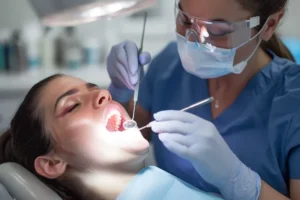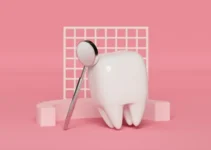Professional dental cleaning plays a crucial role in maintaining overall oral health by removing plaque and tartar buildup that regular brushing cannot manage alone. This preventive measure not only helps in preventing gum disease and cavities but also assists in early detection of potential oral health issues. Regular dental cleanings further contribute to a healthier smile and can even have implications on your general health, linking clean teeth to lower risks of heart disease and strokes. Thus, ensuring you schedule professional cleanings as part of your dental care routine is essential for sustaining long-term oral health.
Benefits of Professional Dental Cleaning
Professional dental cleaning, often referred to as prophylaxis, is essential not only for maintaining an aesthetically pleasing smile but also for ensuring overall oral health. Regular cleanings performed by a dental hygienist or dentist help to remove plaque, tartar, and stains that accumulate on the teeth over time, which are not typically removable through routine brushing and flossing at home. By undergoing professional dental cleanings, patients can enjoy a myriad of benefits that contribute to long-term oral health.
One of the primary benefits of professional dental cleanings is the prevention of gum disease, also known as periodontal disease. Gum disease is a common yet severe condition that can lead to tooth loss if left untreated. Regular cleanings allow for the early identification and management of periodontal issues, helping to maintain healthy gums and supporting structures of the teeth.
In addition to preventing gum disease, professional dental cleanings play a vital role in the early detection of other oral health issues. During a cleaning session, the dental professional can identify signs of potential problems, such as cavities, oral cancer, and systemic health issues that manifest in the mouth. Early detection is crucial for effective treatment and management, ensuring better outcomes for the patient.
Prevention of Gum Disease
Gum disease, an inflammatory condition affecting the soft tissue and bone supporting the teeth, is primarily caused by the accumulation of plaque and tartar. Professional cleanings are instrumental in removing these deposits, which can harbor bacteria that lead to infection and chronic inflammation. By keeping the surfaces of the teeth and gums clean, dental cleanings help to prevent the onset and progression of periodontal disease.
The stages of gum disease range from gingivitis, a mild form characterized by redness and swelling of the gums, to more severe forms like periodontitis and advanced periodontitis, which involve progressive bone loss and potential tooth loss. Regular cleanings and maintenance are key to preventing the escalation of the disease from gingivitis to more severe forms.
- Dental cleanings remove plaque and tartar that contribute to gum disease.
- Cleanings help prevent the progression from gingivitis to periodontitis.
- Maintaining clean teeth and gums reduces inflammation and infection risks.
Moreover, professional cleanings can also include deep cleaning procedures such as scaling and root planing for patients who show early signs of gum disease. These processes help to remove plaque and tartar below the gumline, promoting healing and reducing the pockets between the teeth and gums.
Early Detection of Oral Health Issues
Professional dental cleanings are not just about cleaning teeth; they provide an opportunity for early detection of various oral health issues. During the cleaning process, dental professionals examine the mouth for signs of cavities, oral cancer, and other systemic diseases that may present symptoms in the oral cavity.
Cavities, or dental caries, can often start small and go unnoticed by patients. During a professional cleaning, the dental hygienist or dentist can identify these early signs of decay and recommend appropriate treatments to prevent further damage. By catching cavities early, patients can avoid more extensive and costly procedures later on.
- Detecting cavities early can prevent extensive dental work.
- Regular examinations during cleanings can catch oral cancer early.
- Identifying systemic health issues can lead to prompt medical intervention.
Additionally, oral cancer screenings are typically part of a professional dental cleaning. Early detection of oral cancer significantly improves the chances of successful treatment and recovery. By undergoing regular cleanings and check-ups, patients have a better chance of catching these serious conditions in their initial stages.
Moreover, some systemic health conditions such as diabetes and heart disease can manifest symptoms in the mouth. Dental professionals are trained to recognize these signs and may refer patients to their primary care physicians for further evaluation. This interdisciplinary approach ensures comprehensive healthcare for the patient. In conclusion, professional dental cleanings offer numerous benefits, from preventing gum disease to early detection of oral health problems. By committing to regular dental visits, patients can maintain a healthy and beautiful smile while ensuring optimal oral health. To learn more about maintaining oral health and the benefits of various dental procedures, be sure to check out our other informative articles.
The Process of Professional Dental Cleaning
Professional dental cleaning is a cornerstone of oral health, removing plaque and tartar that regular brushing and flossing cannot reach. This procedure not only helps in maintaining a bright smile but also in preventing periodontal diseases and tooth decay. Understanding the steps involved in a standard professional dental cleaning can help alleviate any anxiety and ensure you are well-prepared for the process.
The cleaning process generally consists of three main stages: Initial Examination, Scaling and Polishing, and Fluoride Treatment. Each of these stages is crucial for maintaining optimal oral hygiene. Below, we dive into the details of each phase to give you a comprehensive understanding of what to expect during your dental visit.
Initial Examination
The initial examination is the first step in the professional dental cleaning process. During this phase, the dental hygienist or dentist will perform a thorough inspection of your mouth to identify any signs of oral health issues, such as gum disease, cavities, or other abnormalities. This helps in tailoring the cleaning procedure to meet your specific needs.
Using a small mirror, the dental professional will look for swollen gums, bleeding, and tartar build-up. They may also take X-rays if needed to get a complete picture of your oral health. This step is crucial as it sets the stage for a targeted and effective cleaning procedure. It’s essential to discuss any dental concerns you may have during the initial examination. Whether it’s sensitivity, pain, or even cosmetic concerns, being open about your oral health can help the dental professional provide the best care possible.
Scaling and Polishing
The next step in the process is scaling and polishing. Scaling involves the removal of plaque and tartar from the teeth surfaces and below the gum line. This is usually done using specialized instruments, either manual scalers or ultrasonic devices, which break down and remove hardened deposits.
The dental hygienist may use an ultrasonic scaler, which emits vibrations to loosen tartar, along with a stream of water to wash it away. After scaling, your teeth will be polished using a gritty paste and a rotating head to smooth the surfaces, making it more difficult for plaque to accumulate in the future.
Polishing not only makes your teeth feel smooth and clean, but it also gives them a shiny appearance. This step can also help in removing surface stains, giving you a brighter smile.
Some of the benefits of scaling and polishing include:
- Prevention of cavities
- Reduction of gum disease risk
- Improvement in overall oral health
Fluoride Treatment
The final step in professional dental cleaning is often a fluoride treatment. Fluoride is a mineral that helps to strengthen the enamel, making it more resistant to decay. This treatment is particularly beneficial for individuals who are at a higher risk of developing cavities.
Fluoride can be applied in various forms, including a rinse, foam, or varnish. The application process is quick and painless, usually taking only a few minutes. The fluoride is left on the teeth for a specific period to ensure maximum absorption.
Studies have shown that regular fluoride treatments can significantly reduce the incidence of cavities and improve overall oral health. It’s a simple yet effective step in maintaining strong and healthy teeth.
After the fluoride treatment, the dental professional will usually advise you to avoid eating or drinking for at least 30 minutes to ensure the fluoride fully sets on your teeth.
This comprehensive cleaning routine not only ensures your teeth are in the best condition but also makes your next dental visit more comfortable and stress-free. For more insights into dental care and other related topics, be sure to check out our other articles.
Frequency of Professional Dental Cleaning
Introduction to Professional Dental Cleaning
Professional dental cleaning, also known as prophylaxis, is an essential component of maintaining oral health. Unlike regular brushing and flossing, professional cleaning involves the use of specialized instruments to remove plaque and tartar that are not removable through regular home care. The process includes scaling and polishing to clean the teeth thoroughly, helping to prevent gum disease and tooth decay. Dentists and dental hygienists are trained to identify and treat areas of concern, ensuring a comprehensive approach to oral hygiene.
Standard Recommendations
The American Dental Association (ADA) generally recommends that individuals receive a professional dental cleaning every six months. This biannual schedule helps to manage the accumulation of plaque and tartar, and allows for early detection of potential oral health issues. Studies have shown that consistent dental cleanings are effective in reducing the incidence of periodontitis and other dental diseases, making it a cornerstone of preventive dental care.
However, it’s important to note that the frequency of cleanings can vary based on individual needs. For example, those with a history of periodontal disease, smokers, and individuals with certain systemic conditions such as diabetes may require more frequent visits. A tailored approach ensures optimal oral health for each patient.
Factors Influencing Cleaning Frequency
Several factors influence the recommended frequency of professional dental cleanings. Some of the key considerations include:
- Gum Health: Patients with gingivitis or periodontitis may need cleanings more often to manage their condition effectively.
- Oral Hygiene Practices: Individuals who maintain excellent oral hygiene at home may require fewer professional cleanings.
- Lifestyle Choices: Smoking, diet, and stress can all impact oral health and affect the frequency of necessary dental cleanings.
- Systemic Health: Conditions such as diabetes can increase the risk of gum disease, necessitating more regular dental visits.
Personalized dental care plans are essential in addressing these individual factors, ensuring that each patient receives the appropriate level of care based on their unique circumstances.
Regular professional dental cleaning is a vital aspect of maintaining oral health. By understanding the factors that influence the frequency of cleanings, patients can work collaboratively with their dental professionals to achieve and maintain a healthy smile. For more detailed information on oral health and dental care, consider reading our other articles on related topics.
Key FAQs on Professional Dental Cleaning
Understanding why professional dental cleaning is crucial can help maintain your oral health and prevent diseases. Here are a few commonly asked questions answered.
Why is professional dental cleaning important for oral health?
Professional dental cleaning goes beyond what regular brushing and flossing at home can achieve. It removes plaque, tartar build-up, and stains that ordinary toothbrushes can’t. These cleanings help prevent gum disease, tooth decay, and other oral health issues. Moreover, regular visits can help your dentist catch any early signs of problems.
How often should I get my teeth professionally cleaned?
The standard recommendation is to have professional dental cleaning at least twice a year. However, depending on your oral health status, your dentist might suggest more frequent cleanings. People with higher risks of dental diseases, such as smokers or diabetics, may need additional visits to maintain optimal oral health.

My name is Salman Kapa, a 73-year-old expert in bone regeneration and dental implantology. With decades of experience in the field, I am dedicated to advancing our understanding of oral health and hygiene. Through my research and writing, I aim to contribute to the development of innovative solutions in dental care.




